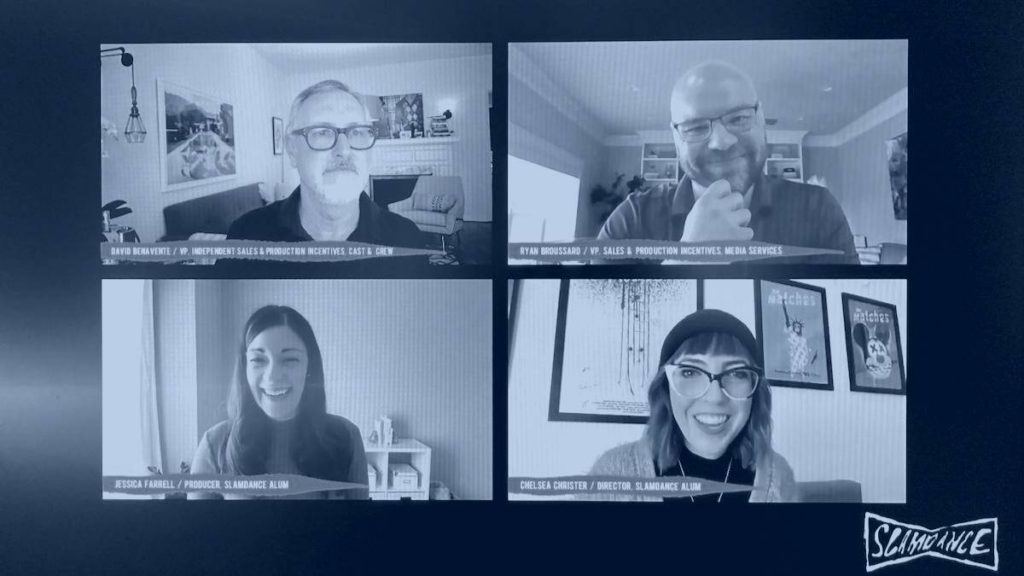
The Slamdance Film Festival went virtual this year. The fest put all of its fresh, often experimental and always independent programming online for festivalgoers to feast on. Among the many online categories and events, Media Services was thrilled to join Cast & Crew and Slamdance alum on a panel to give independent filmmakers a leg up on their next project.
As a show of support for independent film, Media Services and Cast & Crew sponsored the festival, helping coordinate this informative virtual panel discussion to the benefit of creators seeking financial advice and a starting point for future productions.
Ryan Broussard, Media Services’ Vice President of Sales and Production Incentives, spoke to the needs of today’s independent filmmakers. He was joined by co-panelists David Benavente, VP, Independent Sales & Production Incentives, Cast & Crew; along with Jessica Farrell, Producer and Slamdance Alum. The discussion was moderated by Chelsea Christer, Director and Slamdance Alum.
When I Was You I Wish I Knew: Stepping Up Your Next Production covered the very basics of producing and financing a small independent film. The panelists covered important resources, documents, key personnel, financing and film tax incentives – initial stages you need to complete as a producer to get a project up and running.

First Hires for Your Independent Film
The right crew is certain to be the backbone of your film which can determine its ability to succeed. As an experienced film and spot producer, Farrell says your first hire should be an above-the-line producer.
“An above the line producer is going to help you with your budget” says Farrell. “They’ll help with your pitch, help you close out [financing] and get distribution.” You want to hire a producer who has enough experience to get your project across the finish line.
It’s crucial you work with the right person, as the time commitment alone will demand a producer who cares deeply for the project.
“Team up with people that know more than you,” says Broussard. Producers with experience will become your greatest asset. He noted that hiring a lawyer early on is also an indispensable way to keep a production legally above water.
In fact, having the right legal counsel in place can make or break your film. Without the proper legal foundation to build your film on, distributors will quickly turn away from your work.
“Having a lawyer look over your contracts is critical,” Christer emphasizes. “You’re going to feel so much more protected as a creative and as a businessperson to have that infrastructure and legal partner, who knows this industry, in place.”
If you plan on learning how to bond your film and involving a bond company, or any level of senior lending, your primary crew members will matter. Benavente made it clear that a bond company and even some financiers are going to vet your crew. They’re going to look at their credits and evaluate their reputation to ensure they can get the job done.
“When you get to a certain level [of producing], you need to vet your collaborators,” says Benavente. Otherwise, it could spell trouble for financing.
Build a Budget to Jumpstart Your Film
Having the right paperwork in place can simplify your life as a filmmaker. Having well vetted contracts and copyright chain-of-title documents will make selling your film a lot easier. A budget, which became the focus of the discussion, will become your blueprint.
“This is a business,” says Christer. “You need to have the right paperwork in place ahead of time,” even in a business built on creative endeavors.
“Your budget is your bread and butter,” says Farrell. “It’s your roadmap; it’s a way to breakdown what you need.”
When designing a budget, you must consider everything in real-world dollars. Cover all phases of production, down to post-production and the cost of a publicist. Before you even hire a producer, you should have a budget.
Having a realistic budget is also the right way to get taken seriously in pitch meetings, when applying for grants and appealing to investors.
Real numbers are key to finding the right state and incentive program for your film. Broussard knows this to be true. He is well versed in budgets and can quickly discern the difference between a budget that is well prepared, and one that isn’t realistic.
“Make sure you have real numbers, real [union] fringes and real costs. Let it be grounded in reality,” says Broussard.
Broussard also touched on COVID costs. In our current climate, a budget without COVID-related costs is a nonstarter.
As much as a budget needs to be grounded, it needs to look professional. Showbiz Budgeting is our solution to making you look serious when you’re at bat for cash. If you’re a freelancer considering Showbiz Budgeting, contact us first.
“Find out what the industry standards are–use those standards,” says Benavente. As someone who helps finance independent films, he knows for a fact a professionally built budget is the starting point for pitching your film to potential producers and financiers alike.
Laying the groundwork with a solid budget for your film makes it possible for professionals to do the work they need to do to help you.
Financing an Independent Film
Financing is where a well-thought-out budget jumps into action. Having a solid budget can simplify financing by helping you understand where you need to start, where the gaps are and what needs to be adjusted.
When it comes to equity, grants or senior lending against tax credits and pre-distribution sales, Farrell says you should explain all of the line items in your budget in detail. This helps to convince producers, financiers and even film offices that you can pull your independent film off.
Equity Financing
You will always have to start with equity financing, there’s no way around it. This is the money you raise on your own by means of crowdfunding, grants, generous family members or a wealthy friend.
“Equity is the hardest part, because you have to sell yourself and sell your project,” says Broussard. If you run your film like a business, an investor may be more apt to trust you with their dollars.
“Equity is going to be from people that like to invest in films,” says Benavente. “They aren’t attached to any collateral 90% of the time.” At the end of the day, 30-50% of the capital you raise will need to come in the form of equity.
Collateral and Debt Financing for Film
Once you have raised enough equity, you can start looking for that collateral to pin lending to. Collateral often comes in the form of tax credits or minimum guarantees (MGs) from distributors. Collateral is a contractual promise from a state’s film office or from a distributor to pay you money based on what you deliver.
In the case of tax incentives – an audit, proof that you spent money in their state. For a distributor – the film itself meeting agreed-upon conditions.
“The better the collateral, the cheaper the loan,” says Benavente. “Tax credits are very strong collateral. Minimum guarantees are a little more [expensive to lend against],” yet still a reliable solution.
This may sound overwhelming. But, approaching film offices and distributors, doing the research and putting in the work can make a significant difference in the outlook of your independent film.
“Keeping those relationships and rolling them into the next [film] makes it all worth it,” says Farrell. Once you have a network of financiers and producers, your next project will be that much simpler to finance and bring to market.
Grants and Grant Applications Hone Your Pitch
Grants prove to be a great starting point, especially for documentaries or independent films with a niche appeal. Not only do they kick off a unique form of equity financing, grants help you learn about your film and your purpose.
“Applying for grants is the best way to start pitching, to get a gut check on your audience…to find out if your film has traction,” says Farrell. “It helps you get your budget in the right place. Makes sure your synopsis is pitch-able, that your deck is working.”
For documentary filmmakers, for example, the International Documentary Association (IDA) maintains an expansive searchable grants directory.
When you find a grant that aligns with your project’s goals, Christer says the application pricess itself can be instructive.
“Writing about the project forces you to learn about your project in a way that you may not otherwise reflect on,” she offers. “You could realize how the project should be communicated. What may make a project doable. It teaches you how to engage with the people that have money.”
Save Money and Finance with Film Tax Incentives
State tax incentives are all the rage for studio and independent films alike. They allow productions to recover a percentage of the costs incurred for things like wages, kit rentals and even post-production costs. Whether your film qualifies and for how much depends on the state and its minimums, among many other things, like audits or talent caps.
When you want to start exploring tax incentives for your independent film, kick off your research with our interactive film tax incentives map.
When you’re ready, reach out to a film tax incentives professional. They can help guide you to the right state for your project based on your budget. Because tax incentives are mandated by states themselves, every program is different.
“That’s why you want to reach out to someone like Ryan Broussard to figure out whether your film and budget will work in a certain state,” says Benavente.
Additionally, programs are constantly changing, Benavente and Broussard are on top of those changes. A small change could wreak havoc for your budget or financing – even the timing of a change could affect your film. It’s important to know the program you’re applying to inside and out.
As someone who is actively using these credits as collateral and lending against them, Benavente emphasizes the importance of cozying up with your production state’s program.
Real dollars can be lost if something changes at the state legislature.
“A small change can kill our ability to lend against a program,” says Benavente. It’s a good idea to consult someone like Broussard to ensure your film avoids these issues.
The 3 Types of Film Tax Incentive Programs
There are three types of tax incentives programs in the United States. Rebates provide a cash return directly from the state. Refundable credits require you to file a tax return, after which the state will give you cash back. Transferable credits must be sold on the open market for a percentage of what they are worth to an individual or company that needs to offset tax liability, thus unlocking your cash.
“There are minimum requirements that are unique to each state,” says Broussard. He cautions not to be intimidated by the most popular state’s minimum spend. There are plenty of states that have low minimum spends or no minimum at all, with a similar look, that are perfect for low-budget independent films.
When you find a state that might be right for you, do your research.
“Talk to other producers in that state, look at the film office – how they outline applications, define the program and handle the back end,” says Farrell.
Getting acquainted with other producers and line producers in a particular state can go a long way, and they can usually connect you with even more producers who are willing to help. Farrell knows from experience how important those connections are.
“That wealth of knowledge is huge,” she says.
Local Programs and Diversity Bonuses
Local programs are starting to pick up steam. Many of them can be taken advantage of in tandem with state programs. That’s great for your film’s bottom line.
“States are using these programs to drive economic impact,” says Broussard. “There are a lot of states that have local incentives, like the new Iron Range Production Incentive Program in Minnesota.” Benavente adds that there are many areas with an uplift bonus, outside of the typical filming centers and often in economically distressed areas, that give your incentive a percentage increase for filming there.
A new trend coming to state film tax incentives is the diversity bonus. Some states are even starting to require diversity to qualify for their programs at all. This includes crew members behind the camera as much as it does talent!
If you don’t go into a program believing you can qualify for a diversity bonus, don’t be so quick to count your independent film out.
“You might do a diversity study and find that you have a very diverse crew,” says Benavente. In his experience, a film office will expedite a rebate or credit if it meets certain diversity requirements, because they are excited to talk about it.
Research and Networking Strengthens Your Independent Film
Film offices are an indispensable tool when you are starting to put your independent film together.
“Don’t fear film offices, approach them,” says Farrell. “Tax incentives can be the heart of your pitch. Many investors will ask about it immediately. Line producers especially will ask.” As you build out your team, pin down your budget and create a solid pitch, talking to an incentives professional and reaching out to film offices is the next step.
All the panelists agree, it is a real miracle that a film can come into existence at all, through sheer will and determination. Even with a burning passion, everyone needs a hand. There are resources out there for young filmmakers and producers. From grant programs to film offices and when you’re ready – getting in touch with a film tax incentives expert like Ryan Broussard to help place your independent film.
____
Slamdance holds an annual film festival focused on launching the careers of diverse independent voices. Founded in 1995 to provide a space for grassroots communities to showcase their art. The organization programs informative, education and networking events year-round to bolster the work or independent filmmakers.
